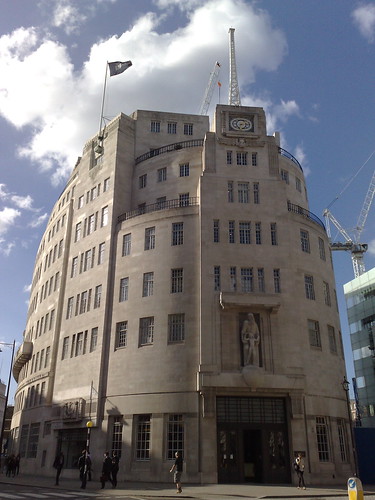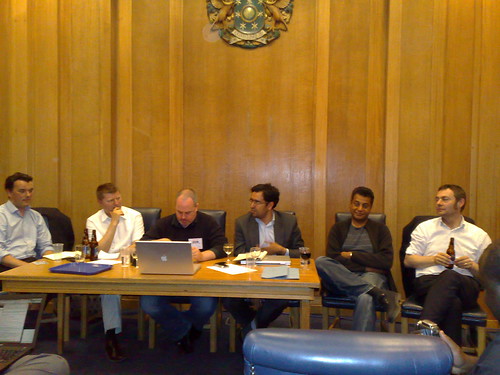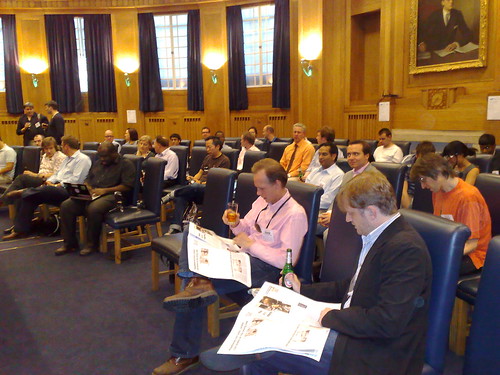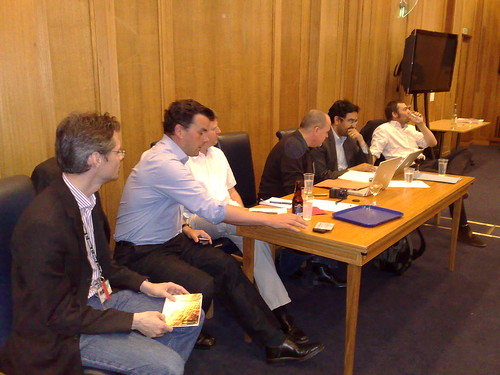 I’ll be live blogging the debate, and posting picture here. Stay tuned
I’ll be live blogging the debate, and posting picture here. Stay tuned
Currently handing out name tags on the door. A long-held ambition….
[Update: Post event, Steve Bowbrick wrote it up here as well]
The start….
I did a quick intro to why this debate happened I won’t bore you here, you’ve heard it, suffice it to say that Steve Bowbrick, chair, came up with the tag-line “A Common Platform” to describe what we think the BBC should build.
The Panel:
Tom Loosemore, Ofcom and former ‘head of Web 2.0_ at the BBC
Jon Gisby, Channel 4’s first dedicated new media director
Azeem Azhar, startups angel investor, ex-BBC, original proposer of the BBC Public License
Tony Ageh, BBC New Media controller of internet
James Cridland, Head of Future Media & Technology for BBC Audio & Music Interactive
Jem Stone, Portfolio Executive, BBC new media
Chair: Steve Bowbrick, entrepreneur, Blogger on BBC policy

Opening remarks (apologies for typos etc, as much of this as possible are direct quotes):
Steve Bowbrick opened the proceedings, introducing all the speakers (Steve suggested the idea for the panel / debate and is a very able chair!)
Azeem Azhar:
The BBC is funded with public funds and at the same time there aren’t great incentives for businesses to develop within a public sector context. But there is an opportunity to fill the gap marked “market failure” without crowding out commercial entities. Look at open source initiatives, with a non-profit motive.
The BBC has this brand value which is second to none, And yet there’s this question of who are you competing against. 10 years ago TV controllers would get in to the office in the morning, run into their HP Gateway desktops to look at the overnight ratings. Built into the DNA was the view we were measured apple for apple against a commercial entity like ITV. If you spend time trying to compete on that basis you have to compete in the same way.
So the first question is whether the culture of the BBC has changed, whether the Yahoo’s / Google, etc would be considered “successful” at the BBC. So long as the metrics are the same the outcomes are similar,. But is the BBC now no competing on the same terms as the entrepreneur / startup and the newspaper web sites?
We now live in a world where people carry maybe even two phones. It’s a digital world. So is there not now an opportunity to re-create the mission of the BBC for the 21st Century?
Jem Stone:
Considering its huge staff and long history I’d like to defend what the BBC has achieved so far.
The thing about this debate is you really should be careful what you wish for. We could talk about events like Mashed, an initiatives around innovation etc but if you push this then the argument often turns into “the BBC is crowding out commercial entities” and that’s then when the argument turns against the BBC’s funding.
Now across the BBC, from the top downwards, it’s not just the engineers, it’s the guys in suits, many who are former eningeers – they do subscribe to re-engineering the BBC. Also, there is a selfish reason – in terms of the BBC’s funding – under review in three years time, and seeing Carolyn’s Thompson’s recent speech promoting innovation.
It’s in the interests of the BBC to have a platform. The ultimate goal should be to make the web better. Bill Thompson says by creating machine readable data, you create not so much a BBC, but “a BBC everywhere,” which shines a light on how the BBC should be funded.
Bowbrick: Is there a worry about an upswell of dissatisfaction with the BBC coinciding with David Cameron coming to power?
Stone: There are different views about how it should be funded yes.

Tom Loosemore
I feel schizophrenic about this debate. On the one hand I have sympathy and admiration for BBC people getting the data out of the BBC. But the truth is the BBC is not lead by people who understand the Web. Look at the senior echelons. There is not a senior person on the BBC Trust who has any web experience at all. I’ll take that back when there is a candidate for Director General who is a former Web person.
(Intergejction from audience: “Well Jeremy Peters is on Facebook vomitting slugs”)
The question is what should public institutions do to foster more world beating products? Here’s my suggested list:
The BBC’s Research and data is unbelievable. Audience research is amazing. But they don’t really use it yourselves. They probably have better data about non-BBC programmes than non-BBC broadcasters.
Code: A big part of Azeem Azhar’s BPL idea was open source. But the BBC’s infrastructure is a train crash right now – but it will get fixed.
Data: I hired Ben Metcalfe. It enjoyed it. It was a challenge thereafter. But I give a lot of credit to what Backstage has done. The BBC is a broadcaster. It’s very constrained and so all the Backstage licenses are non-commercial. Don’t expect tonnes more. But the Government has tonnes of data. It has a relatively enlightened policy. You can re-use commercially core government data but it’s a mess trying to get hold of it. If you come to OpenTech we’ll show you what’s possible.
Channel 4: When you look at Backstage data, the best data is not owned by the BBC but it’s where they have acted as a broker. There is an interesting role there for the BBC as as an honest broker over data.
Shared tools: Make the Internet better. I want a Geolocation API for postcodes. I want to be able to find communities of interest. I’d like to be able to see and search what UK bloggers are saying. I want better serendipity.
Let’s help small businesses become better small businesses. This is where Channel 4 could excel, where it helped with production companies. It could do it on the Web. It’s invested in School of Everything for instance.
The BBC has had a role to be a trusted guide to the web but it’s development in this area has been absolutely lamentable. That’s cultural.
Finally, the Internet needs to stay open. We are only here if the Internet stays open. There are “next generation broadband” products coming along which do not necessarily mean next gen Internet.
James Cridland:
In radio we agree on technology and compete on content. We agree and co-fund with commercial radio RAJAR. Using paper diaries alas. We agree and have co-marketed digital radio. We agree on NICAM, teletext, you name it. We are looking at Radio DNS to look for IP-enabled web services. And other things that the BBC has done in it’s time are … the reason people agree that the Web is a trustworthy source of news is down to BBC News Online. When we say forward slash, that was some BBC steering group which came up with that phrase.
I’d like to stress, in terms of how the BBC operates we have a massive positive effect.
John Gisby
I was at the BBC ten years ago, at the time was some of the initial Internet investment was being planned. The flavour of the debate then, as now, was looking at the Net as a distribution platform, not unlike Chanel 4 – distributing content. At the BBC, lots of people, about 40, were called “Controller” but there in lies a challenge. In broadcast it’s about control. My guess is there is no-one in the business right now called “enabler.” And the reason is first, there is a lot of DNA that takes a long time to change. Think about that at the BBC and Channel 4. We’re about distribution, it’s not necessarily about being a tech company or having an impact on industrial policy [Read, helping startups – Ed]. Anything in that area is a by-product not a core policy.
Finally there’s the commercial angle. There are constraints. There are a whole series of things which are not anybody’s fault.
In terms of where Channel 4 comes in, we are not a tech company. We outsource a lot of what we do. The platforms we have are relatively light, purely in investment terms.
We have some of the advantages of the BBC in that we’re publicly owned, but we are able to play commercially, and do hybrid funding models, such as mix public money with commercial. We have a brand which has an attachment with a younger online audience. We have the ability to cross promote and aggregate, in less constrained ways, such as via partnerships. We don’t have in-house production. We think there is an interesting role we can play, Next on 4, a pilot over the next two/three years. 4IP will have about £50m which is enough to do damage. We’re not necessarily starting with TV, but look at pushing content and services out to audiences. We expect entrepreneurs will be involved in that, and with significant businesses who want to play in this space.
We share the aspiration, we think we can do something new in this space and will be having lots of conversations. We will have some spectacular failures, but also successes. Critically we want to learn to operate in a new space which we think is critical.

Tony Ageh
I agree hugely with what Mike Butcher wrote. We’re here to answer a challenge. I also think Azeem is right. Some of the ways the BBC measures itself… it’s never quite addressed the opportunities to re-invent itself for the 21st century, but I think it will happen. But it should have happened over the last decade.
I think the BBC is the License fee. If that stops, it becoomes a media company like any other.
The BBC needs to focus more on the outcomes and how to further its objectives using the technology now rather than looking backwards. If the Net had happened first, the funding wouldn’t have gone into TV. We need to focus on what Mike said. The challenge is to step up and use this medium to its full. In some cases that will be allowing small businesses to make money, but that shouldn’t be at the core.
A common platform has three things: Standards, Technologies, Content and data.
When it comes to standards the BBC should look to its past. When it started it was an engineering company which made other radio stations comply with its standards. With the Web, it could have been more active and shaped and driven standards, rather than maybe overwhelming it. Azeem’s 138% effort is a red herring. In the early days all the engineering took the funding, then the content happened. But we could have created a platform for entrepreneurs and we didn’t.
Tom Loosemore tried three times, with trhee different policies. Foundation, Web 2.0, Backstage. Eventually he did persuade them that they needed to start from scratch. I think we should start from scratch and start using open source technologies and put the code in the public domain. We shouldn’t be warehousing code.
In terms of content there MUST be data the BBC can share. I know the issues around rights, but there MUST be data we can share,
The Creative Archive was a disaster for a number of reasons. But the whole BBC site should be the “creative archive”. It won’t be everything but it’s a good starting point.
We shouldd be aggregating data form other sources, driving standards and making them interoperable. We have the ability.
Are we broadcasters or not? We think like that, but it may be beyond this generation to change. Increasingly we are seeing a new wave of people thinking in new ways. They don’t think in terms of control, or time, or scheduling, or moderation. People who think like that will move the BBC into the new era.
(Q&A then ensued. I will load those notes as soon as I have taken out the typos!)
Meanwhile, here’s some rough video I streamed from the event “live” using a new service called ubcam.com